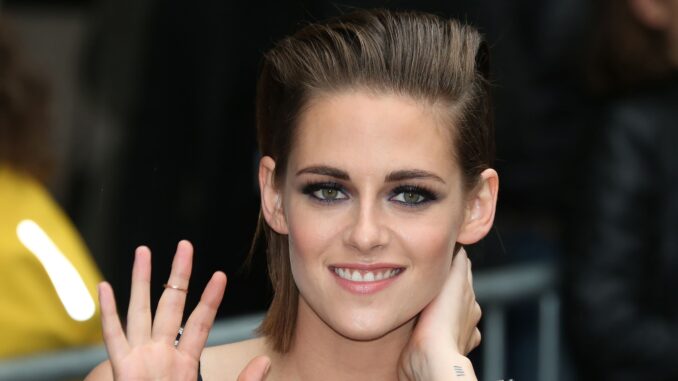
The Hollywood firmament is crowded, a glittering, often chaotic expanse where stars are born, blaze, and sometimes, spectacularly, burn out. For a long time, Kristen Stewart was a peculiar kind of star: bright, undeniable, yet perpetually flickering, as if she were a celestial body reluctant to hold still for the camera. The awkward shrugs, the hair-tucking, the guarded intensity that defined her Twilight era persona became an almost ironic shorthand for a generation’s uneasy relationship with fame. But those days, like the fleeting glow of a meteor shower, are fading. Kristen Stewart’s star is not just growing up; it’s solidifying, finding its true gravitational pull, and is increasingly poised to speak up, with an articulate and unyielding voice, for women artists everywhere.
The “growing up” of Kristen Stewart’s Hollywood star has been a masterclass in quiet, defiant evolution. From the brooding intensity of Bella Swan, a character she seemed both to inhabit and subtly resist, she shed the skin of teen idol with the purposeful grit of a snake. Her pivot to independent cinema wasn’t a retreat; it was an artistic pilgrimage. Films like Clouds of Sils Maria, Personal Shopper, and Certain Women weren’t just roles; they were a curriculum, a deliberate honing of her craft under the tutelage of visionary directors like Olivier Assayas and Kelly Reichardt. She chose complexity over comfort, ambiguity over easy answers, often embodying women on the fringes, grappling with identity, grief, or the ethereal. This period wasn’t about seeking mainstream validation but about building an unassailable artistic foundation, understanding the nuances of storytelling from the inside out. Her discomfort in the spotlight transmuted into an authentic, almost vulnerable power, proving that an artist can dictate her own terms of engagement with the public, and that true strength often lies not in bravado, but in unflinching authenticity.
As her star has matured, so too has its capacity to “speak up.” Initially, this speaking was subtle, enacted through her choices. By consistently collaborating with women directors, starring in films that dissect the female experience with precision and empathy, and increasingly using her platform to discuss gender disparities in the industry, she has been, for years, advocating through her very presence. Her own foray into directing, starting with short films, is not merely a personal ambition but an act of solidarity. By taking the reins behind the camera, she implicitly champions the idea that women belong in every seat of power within the creative landscape, challenging the historical imbalance not with rhetoric alone, but with action. Her very existence as an openly queer, unconventional leading lady who refuses to conform to traditional Hollywood molds is a form of powerful, unspoken advocacy, normalizing diverse representations and proving that success doesn’t require fitting into a predetermined box.
But imagine when Kristen Stewart’s Hollywood star fully steps into its mature, directorial, and perhaps even curatorial phase. Picture a future where her name on a project isn’t just an acting credit, but a stamp of artistic integrity and a signal that a woman’s vision is at its core. When she directs her first feature, as she is poised to do, it won’t merely be a film; it will be a manifesto. Her unique journey, from mass-market phenomenon to indie darling, gives her a perspective few others possess. She understands both the machinery of blockbuster entertainment and the delicate, often underfunded world of independent art. This dual understanding could make her an incredibly effective, even revolutionary, advocate.
Her voice, once characterized by its elusive murmur, now carries the weight of hard-won experience. When she speaks, it’s not with the calculated polish of a media trainer, but with the thoughtful intelligence of an artist who has wrestled with her craft and her identity in the public eye. Imagine her not just speaking about the need for more women directors, cinematographers, writers, and producers, but actively creating the space for them. She could head a production company dedicated to nurturing female talent, becoming a formidable patron of stories that challenge the patriarchal gaze. She could establish mentorship programs, fund grants, or curate film festivals that spotlight emerging women artists, using her considerable influence to open doors that have historically remained shut.
When Kristen Stewart’s Hollywood star fully grows up and speaks up, it won’t just echo the sentiments of other advocates; it will resonate with a unique, visceral truth born from her own improbable trajectory. It will be the sound of a once-reluctant icon embracing her power, not for personal gain, but to illuminate pathways for those who follow. Her star, once a flickering curiosity, is transforming into a steady, radiant beacon, signaling a brighter, more equitable dawn for women artists, a testament to authenticity, resilience, and the quiet power of a star that dared to define its own orbit.
